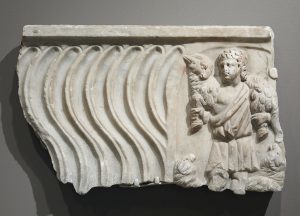Monday Meditation — RCL Year B, 4th Sunday of Easter, John 10:11-18
 CC by Walters Art Museum-SA 3.0
CC by Walters Art Museum-SA 3.0“I am the good shepherd,” says Jesus.
Among the “I Am” sayings in John, “I am the Good Shepherd” is particularly beloved. There is tenderness and love in it that appeals to both children and adults.
One of the earliest images in Christian art is that of a shepherd, gently carrying a sheep across his shoulders.
John 10:11-18
Like in many of Jesus’ speeches, in John 10:11-18 Jesus bounces between emphases, rather than laying out a logical progression. This portion of the larger passage one can see several:
Jesus is not like some hired hand who doesn’t really care about the sheep. They are his and he loves them.
There really are dangers and enemies for Jesus’ followers, like wolves that threaten sheep.
Jesus really knows us, just as the Father really knows Jesus — a sort of pre-echo of the intimacy in High Priestly Prayer of John 17.
The sheep currently in the fold are not Jesus’ only sheep. Surely they thought of this when the Risen Christ called them to be his witnesses to the ends of the earth (Acts 1:8).
The Good Shepherd Lays Down His Life
But there is one more emphasis that seems most important, if only because Jesus states it multiple tims: the good shepherd lays down his life for the sheep.
Laying down his life is the opening, the very nature of the Good Shepherd.
Laying down his life is in the middle, the answer to the problems of wolves who attack, and frightened hirelings who run away.
Laying down his life is the mysterious promise that makes possible his mission to the sheep outside the current sheepfold.
And laying down his life is not the end — it is for the sake of taking it up again, which surely accounts for this text appearing in Easter season.
The promise of Jesus to gather in other sheep and make them one united flock was, for the Reformed Christians of the sixteenth century, what we would call their sense of mission. They prayed, often, both for help to love their neighbors and for Christ to gather in the lost sheep.
Of His Own Free Will
I am struck, however, by how emphatic Jesus is here about his own choice in laying down his life. Much ink has been spilled in recent decades about apparent horrors in God the Father sending his only-begotten Son to his death. It sometimes gets portrayed as divine child abuse.
By contrast, here Jesus is quite clear: nobody forced him.
Jesus laid down his own life out of love, and that love is pleasing to his father. Or as another apostle put it, Jesus “for the sake of the joy that was set before him endured the cross,” (Hebrews 12:2).
The Orthodox, by the way, really hammer that point home. In every Liturgy the priest proclaims in prayer “…on the night in which He was delivered up, or rather when He delivered Himself up for the life of the world, He took bread in His holy, pure, and blameless hands…” The sentiment is echoed in other Orthodox hymns and prayers, always declaring the joyful self-giving of the shepherd who willingly lays down his life for the sheep.
I wonder what would make me feel more like Jesus very own sheep?
I wonder what wolves might be lurking in my world and my life?
I wonder who might be Jesus’ own sheep but aren’t yet part of his sheepfold?
I wonder if it makes a difference that Jesus freely and willingly laid down his life for us?
++++++++++++
To get my Monday Meditations and other posts and news in your own personal inbox, sign up for my weekly(ish) newsletter using the orange button in the black box below…
The post Monday Meditation — RCL Year B, 4th Sunday of Easter, John 10:11-18 appeared first on Gary Neal Hansen.



